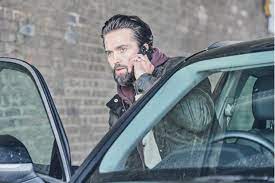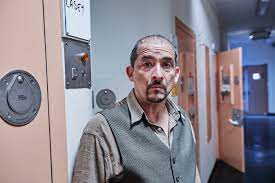A residential tower block looms above a nondescript, and anonymous, housing estate somewhere in England. Atop the tower block is a young police officer, PC Lizzie Adama (Tahirah Sharif), who appears to be going into shock, and a five year old boy in a bear suit onesie, Ben Stoddard (Rex Parry).
Lying prone on the concrete floor below, covered in blood - and dead, are Adama's colleague, a jovial fat policeman by the name of Hadley Matthews (Nick Holder) and fifteen year old Farah Mehenni (Lola Elsokari).
How did they get there? Did they jump or were they pushed? In ITV's The Tower that is the question that the detectives assigned to the case, DS Sarah Collins (Gemma Whelan) and DC Steve Bradshaw (Jimmy Akingbola), must find the answers to. But in looking for these answers, as you may have predicted with this kind of drama, they will uncover all manner of hidden secrets and perhaps reveal some wider truths about the role of police in society and how modern Britain works.
Why does Lizzie go missing almost as soon as she comes down from the top of the tower? Why is Farah's father, Younes (Nabil Elouahabi) in police custody and who put him there? Why is DI Kieran Shaw (Emmett J Scanlan) so determined to hinder Collins' and Bradshaw's work and what is his relationship with his superior, DCI Tim Bailie (Karl Davies)?
Under Jim Loach's direction, and with the screenplay adapted from Kate London's book 'Post Mortem' by Patrick Harbinson. The Tower unravels both backwards (via a series of flashbacks leading up to the deaths) and forwards as Collins and Bradshaw carefully try to piece together not only what happened to cause the deaths but, if possible, why it happened.
As you may reasonably expect, there are lots of sideways glances and seemingly throwaway comments that may indicate a character's true motivation and although The Tower is neither as gripping, nor as moving, as some other dramas in this genre I have watched recently it is compelling and unpredictable to the very end.
Beneath vertigo inducing overhead shots of the tower itself, the story touches on themes of misogyny, racism, immigration, infidelity, and loyalty - as well as Rolos - and in doing so visits some rather dark places as the plot continues to thicken throughout its near three hour running time. There's lots of cop versus cop rivalry (a must in the age of Line of Duty it seems) as well as a near superfluous sex trafficking storyline that sometimes feels as if its been tagged on to capture the zeitgest.
That's another Line of Duty borrow. As is the almost completely unnecessary scenes where we get a glimpse of Collins' personal life. Her ex-girlfriend is now with a man and has recently had a baby. Collins still misses her and even takes to wearing one of her blouses. None of which adds anything to either the storyline or even helps flesh out her character.
But there are a couple of scenes, one involving captured CCTV footage that reminded me of the Jamie Bulger murder case and another in which a key character appears to reveal their true identity, which are particularly brilliantly realised.
The latter scene sent a chill right up my spine - and I was sat next to a radiator. If The Tower had ended on a note like that it would have been an even better drama than it was but, instead, it wasted some of the goodwill it had earned by including a couple of final scenes that hinted, in a rather over confident - as well as a far too laborious way, that The Tower would be back for a second series.
Sequels and second series must be merited, rather than assumed, and, to be fair, The Tower did just about enough to warrant one. Credit to players in minor roles like Harriet Webb as DC Alice Parker, Michael Karim as DC Arif Johar, and Sally Scott as Carrie Stoddard, a middle class single mum who claims she's being harassed by Younes Mehenni. But credit more to the key players.
Scanlan plays shaw with an oily menace that hardly befits the sexual magnitude he's supposed to have, Whelan and Akingbola get less glamorous but more important roles, Holder as an overweight and old school copper does just enough to portray that mix of a man at odds with how the modern world is, and, best of all, Sharif gets to show how much range she has as a performer and with one lingering look, either out at the sea or straight through one of her supposed superiors, she conveys a wisdom way beyond her years. The Tower has seen murder but so, too, has Lizzie Adama. Reflected in her eyes, and reflected in this drama, we see it too.











No comments:
Post a Comment